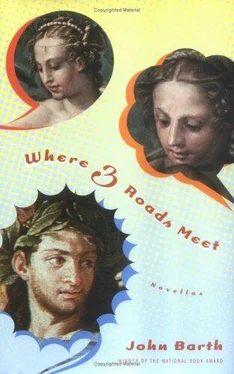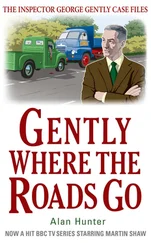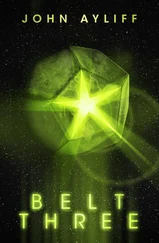Which, however, in Will Chase's case and that of a few others in his (all-white) graduating class, it did not. Since junior high school — or "upper elementary," as sixth and seventh grades were called in that abbreviated system — the lad had made an avid, if noisy, hobby of jazz percussion, and with comparably amateur-but-dedicated classmates on piano, trombone, and alto saxophone had formed a combo to play weekend dances at the local yacht and country club. In the spring of their "senior" year — thanks to the sax-man's father's business connection with a club member who had further connections up and down Maryland's Eastern Shore, they auditioned for and by golly won the best summer job any of them could imagine: At a fading old steamboat-era resort on the upper Chesapeake, still visited in season by daily excursion boats from Baltimore, the quartet would play two hours of dance music in the waterfront dance hall every afternoon while the boat was in and three hours more every evening for vacationers-in-residence, in return for a modest salary and free lodging in a storeroom-turned-bunkhouse at the end of the club's pier. Better yet, on Saturdays the oddly instrumented foursome was to expand to a small orchestra: three saxes (their alto plus two tenors or maybe even a baritone, if they could find one), three brass (the trombonist-leader plus two trumpets, if they could be found), and three rhythm (pianist and drummer plus a bassist, if et cetera). Swing-band-type lighted music stands; uniforms (broad-shouldered lapelless jackets and slightly pegged pants were "hep" just then, also black knit neckties and black-plastic-framed eyeglasses, whether one needed them or not); upgraded (secondhand) Zildjian cymbals and Slingerland drums! Instead of the combo's one-volume fake-book of the melody lines and chord progressions of all the standards, and their improvised "head arrangements" of whatever was current or recent on the Hit Parade, they would have a veritable library of store-bought stock arrangements with separately printed parts for every instrument — plus any "specials" that might be scored by whoever in the group had sufficient interest and ability in the orchestration way.
Which Whoever turned out, if mainly by default, to be Will Chase. Although he'd had no musical training beyond the half-dozen years of piano lessons that most youngsters took in those days, he had learned from them some basics of theory and harmony as well as how to read music, and from his combo-comrades something of the ranges and peculiarities of their instruments. All hands were, moreover, rapt listeners to the exciting new progressive-jazz recordings of Stan Kenton, arranged by Pete Rugolo; to Billy Strayhorn's sophisticated arrangements for Duke Ellington; and to Sy Oliver's for Tommy Dorsey. And so while his buddies expanded and numbered the library, acquired the dressy music stands and the group's first-ever sound system (as primitive by later, rock-era standards as a manual typewriter in the age of desktop computers), and scrambled for the weekend supplement of sidemen and for manageable rehearsal times and venues, Will set about earnestly trying his hand not at composition, for which he knew himself to have no gift, but at transforming by reorchestration some existing, preferably familiar melody into something new, an attention-getting showcase for the band. So enamored of and engrossed in this novel activity of arranging did he become in the spring of that year, and even more so when the expanded orchestra was actually recruited, rehearsed, and swinging on summer Saturday nights at the Bohemia Beach Club, that he dared to imagine — as he never would have about his at-best-adequate instrumental ability — that here might be his vocation: his true calling.
"But it wasn't, quite," Narrator hears the tutelary spirit of Al Baumann interrupt this extended interruption-of-an-interruption to declare, "and so when the Bohemia gig runs its course in late August and our webfoot Wilfred wonders what to do with himself next, he takes his bass player's advice and the scholarship he claims to've forgotten he'd applied for, and he climbs out of his down-county tidemarshes like a wide-eyed, wet-behind-the-ears amphibian and crosses the Bay to join me at VVLU — and there they-all sit at the present time of this so-called story, interrupted by that second phone call, but you've been nattering on so about the Hicksville school system et cet that you haven't even gotten yet to the Three Freds' ménage à deux et un peu, and Lou Levy's Cheatery, and why Winnie used to take all our phone calls at Briarwood Three-oh-four. Your Tutelary Spirit suggests you save all this Arranger stuff for a memoir somewhere down the road and get on with our made-up story: Win can't keep Levy on hold forever."
Roger wilco, old buddy — after establishing (a) that this six-hours-a-day, six-days-a-week band gig (Mondays off) taught Will Chase unequivocally that his orchestration, like his percussion, was after all no more than a better-than-average amateur flair, not a pre-professional talent; also (b) that the search for those additional Saturday-night side-men turned up a few college types from Baltimore who commuted to the job by excursion boat and stayed overnight in the club storeroom with the combo — among them the pianist-turned-bassist Alfred Baumann from what we're calling Veritas Vos Liberabit University, that being its motto, and his Goucher College girlfriend Winifred Stark, a Library Science major and Music minor (commuting downtown to her keyboard lessons at the Peabody Institute) every bit as able on piano as was her versatile boyfriend, or for that matter the group's regular ivory-tickler, who therefore happily took weekends off, as the other sidemen could not. And (c), as has been intimated, that it was Will Chase's fortuitous acquaintance with said bassist (the first he'd ever worked with, and what a difference in the band's beat, and how much one learned from him on the job, about everything from leaving the basic four-to-the-bar mainly to him and using one's bass drum more for accents, to pushing one's already-thinning hair into a fifties-style pompadour!) that persuaded him, not to abandon music, but to set aside career ambitions in that line and give college a try instead, at least for his scholarship year. He remains much obliged to this hour, long-gone Al-pal, for that suggestion.
"Well: My suggestion, as you call it, was that after that shall-we-say Bohemian summer, Will Chase would be a fucking idiot to go back to his dear damp Marshville instead of giving big-city academia a try. That he had a better shot at quote Finding Himself, whoever that might be, in a VVLU seminar room across the Bay than in his folks' ma-and-pa drugstore. Besides which, Win and I needed a drummer for the new club-style trio that we had in mind but hadn't named yet, and given our three first names, the choice was a no-brainer, as they say nowadays but didn't back then. So introduce us to the Reader already, okay? Something more than that résumé stuff a few pages ago?"
Narrator's pleasure, if Will Chase ever finds his voice. Meet Al Baumann, Reader: twenty-one years old at the time here told of, but already deep into Otto Rank's 1909 treatise Der Mythus von der Geburt des Helden; also Lord Raglan's magisterial synthesis The Hero (1936), and his own interdisciplinary doctoral dissertation on the Ur-Myth's ubiquity in the literature of Western civilization—
"Not just Western, man! And not just the guy's birth, either: I was into the whole Heroic Cycle shtick already by the time Campbell's Hero with a Thousand Faces came out in 'forty-nine."
That you were — as one appreciates now but could scarcely then. If things had gone differently, it'd be Alfred Baumann instead of Joseph Campbell whom we'd be watching public-television documentaries about.
Читать дальше












